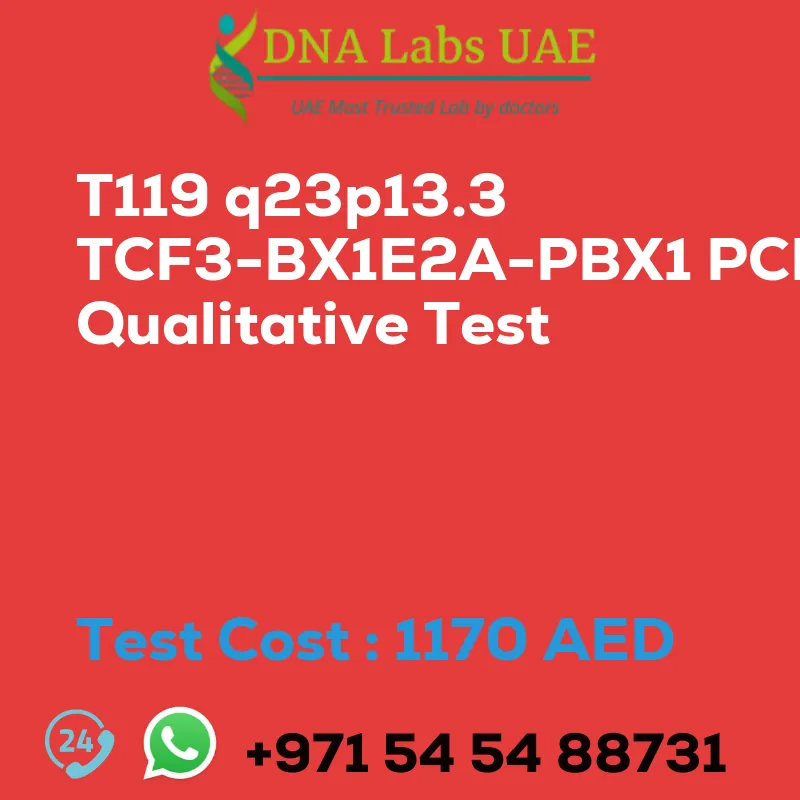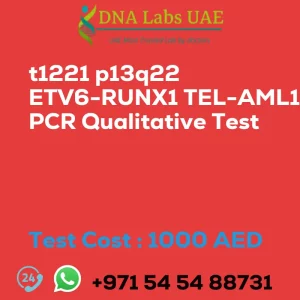t119 q23p13.3 TCF3- BX1E2A-PBX1 PCR QUALITATIVE Test
Cost: AED 1170.0
Symptoms and Diagnosis
When it comes to diagnosing certain types of leukemia, such as acute lymphoblastic leukemia (ALL), genetic testing plays a crucial role. One specific molecular diagnostic test used for this purpose is the TCF3-BX1 (E2A-PBX1) PCR qualitative test. This test helps in detecting the presence of the TCF3-BX1 fusion gene, which is associated with ALL.
Test Components
The TCF3-BX1 (E2A-PBX1) PCR qualitative test is performed using a patient’s blood or bone marrow sample. The test requires a 3mL (2mL minimum) whole blood or bone marrow sample collected in a Lavender Top (EDTA) tube. It is important to ship the sample refrigerated and avoid freezing it. Additionally, providing the patient’s clinical history is mandatory for accurate interpretation of the test results.
Report Delivery
The sample for the TCF3-BX1 (E2A-PBX1) PCR qualitative test is collected on Monday or Thursday by 11am, and the report is delivered on Wednesday or Saturday.
Method and Test Type
The TCF3-BX1 (E2A-PBX1) PCR qualitative test is performed using the Real Time PCR method. This method allows for the amplification and analysis of specific DNA sequences. The test specifically focuses on detecting the presence of the TCF3-BX1 fusion gene associated with ALL, making it a valuable tool in leukemia diagnosis.
Doctor and Test Department
The TCF3-BX1 (E2A-PBX1) PCR qualitative test is typically ordered by an Oncologist, a doctor specializing in the field of oncology. The test is performed in the Molecular Diagnostics department of the DNA Labs UAE.
Pre Test Information
Providing the patient’s clinical history is mandatory for accurate interpretation of the TCF3-BX1 (E2A-PBX1) PCR qualitative test results. This information helps the healthcare provider in making an informed diagnosis and treatment plan.
Test Details
The TCF3-BX1 (E2A-PBX1) PCR qualitative test is specifically designed to detect the presence of the TCF3-BX1 fusion gene, also known as the E2A-PBX1 fusion gene. This fusion gene is associated with acute lymphoblastic leukemia (ALL). The test uses the polymerase chain reaction (PCR) technique to amplify and analyze the DNA from a patient’s blood or bone marrow sample. PCR allows for the detection of very small amounts of target DNA, enabling the identification of the fusion gene.
It is important to note that the TCF3-BX1 (E2A-PBX1) PCR qualitative test is focused on determining the presence or absence of the fusion gene, rather than quantifying its amount. A positive result indicates the presence of the fusion gene, which can aid in the diagnosis and management of ALL.
However, it is crucial to understand that this test is specific to the TCF3-BX1 fusion gene and is not a comprehensive test for all types of leukemia or genetic abnormalities. It is recommended to consult with a healthcare provider specializing in hematology or oncology to determine the appropriate genetic testing required for an accurate diagnosis.
The TCF3-BX1 (E2A-PBX1) PCR qualitative test is performed in a specialized laboratory by qualified professionals. The test results are usually interpreted by a pathologist or geneticist with expertise in the field.
| Test Name | t119 q23p13.3 TCF3- BX1E2A-PBX1 PCR QUALITATIVE Test |
|---|---|
| Components | |
| Price | 1170.0 AED |
| Sample Condition | 3mL(2mLmin.) wholeblood\/Bone marrowin1LavenderTop(EDTA) tube.Shiprefrigerated.DONOT FREEZE. Clinical history is mandatory. |
| Report Delivery | SampleMon / Thuby 11am;Report Wed /Sat |
| Method | Real Time PCR |
| Test type | Leukemia |
| Doctor | Oncologist |
| Test Department: | MOLECULAR DIAGNOSTICS |
| Pre Test Information | Clinical history is mandatory. |
| Test Details |
The TCF3-BX1 (E2A-PBX1) PCR qualitative test is a molecular diagnostic test used to detect the presence of the TCF3-BX1 fusion gene, also known as E2A-PBX1 fusion gene. This fusion gene is associated with a specific type of leukemia called acute lymphoblastic leukemia (ALL). The test involves amplifying and analyzing the DNA from a patient’s blood or bone marrow sample using the polymerase chain reaction (PCR) technique. PCR is a method that allows for the amplification of specific DNA sequences, enabling the detection of very small amounts of target DNA. The qualitative aspect of the test means that it is designed to determine whether the TCF3-BX1 fusion gene is present or not, rather than quantifying the amount of the fusion gene. A positive result indicates the presence of the fusion gene, which can help in the diagnosis and management of ALL. It is important to note that this is a specific test for the TCF3-BX1 fusion gene and is not a comprehensive test for all types of leukemia or genetic abnormalities. The test is typically ordered by a healthcare provider specializing in hematology or oncology and is performed in a specialized laboratory. The results of the test are usually interpreted by a qualified pathologist or geneticist. |








